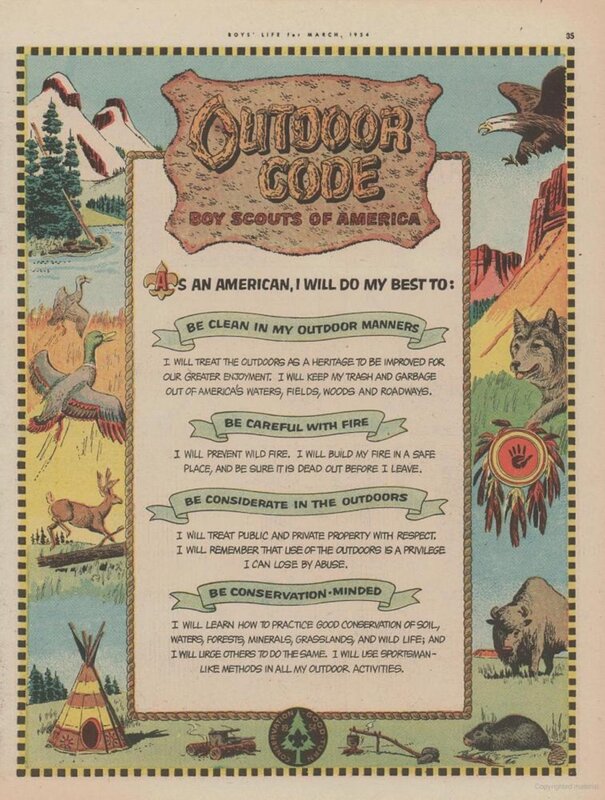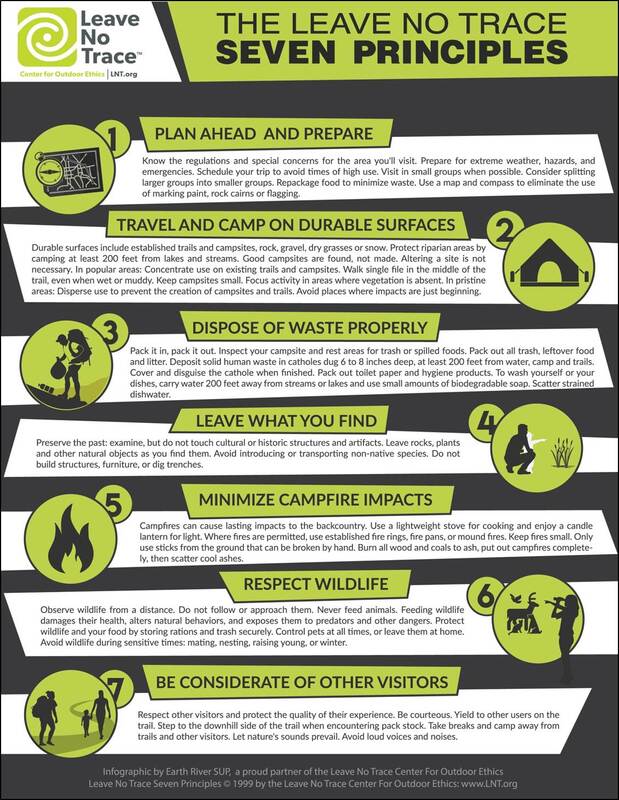How to Enjoy the Outback and Leave it in a Condition for the Next Adventurers to do the Same Last week we received an email from Troop 325 of the Boy Scouts of America (BSA) - a troop located near San Diego, California - thanking us for all the camping and hiking tips on our HCS website. It turns out that when the Scouts from Troop 325 were writing their “Outdoor Code” principles they found a lot of ideas and helpful links on our site. As an Eagle Scout, and Philmont ranger, I’m always glad to receive positive feedback from Scouts – especially since the main reason we built our website was to pass on some of the knowledge, research, links, and tips that we’ve gathered over the years. Their email also got us to thinking that the “Outdoor Code”, and the ethos that it embodies, would make a great blog post. So that’s our topic for today. For those of you not familiar with the “Outdoor Code” it first showed up in Boys' Life magazine’s March 1954 issue, which featured "An Outdoor Code for Americans" and "BSA's Conservation Good Turn". The Good Turn was prompted by a request from President Eisenhower, challenging the Boy Scouts to raise public awareness about the importance of caring for our natural resources. Now, 66 years later, the Outdoor Code is probably even more relevant to all of our outback activities since there are more people out there enjoying the beauty and challenges that Nature has to offer. Since its initial publication in 1954 the wording of the Outdoor Code has changed slightly to keep up with the times. Here’s the latest version: As an American, I will do my best to…
For those of you not familiar with the Outdoor Code, you may have seen similar outback principles under the title of “Leave No Trace” – a movement that began in the 1960’s and 70’s when there was a significant increase in the number of visits to US National Parks. This movement eventually drove the United States Forest Service, in conjunction with the National Outdoor Leadership School (NOLS), to develop a national education program on “Leave No Trace” in 1990. Today one of the main drivers of the Leave No Trace activities is the Leave No Trace Center for Outdoor Ethics with their “The Leave No Trace Seven Principles” (© 1999 by the Leave No Trace Center for Outdoor Ethics: www.LNT.org). Their 7 Principles are:
The Leave No Trace Center for Outdoor Ethics has even refined their principles into 7 Principles for the Frontcountry:
Obviously, both the Outdoor Code and the Leave No Trace Seven Principles are great guidance for how everyone should act during their activities in the outback; with education hopefully more people will. So, back to Troop 325 - in addition to suggesting this whole blog topic, as a way of helping spread their knowledge they also sent us the link to an article that we hadn’t seen: "Leave No Trace: Low-Impact Campgrounds" from www.wristband.com, written by Michele Wheat. This article has some great information about “Low-Impact Camping Tips” and “How to Hike and Leave No Trace”. The article also has links to over 20 other websites with additional resources. You should give it a read. If you want more information on the Outdoor Code, or Leave No Trace, here are several links to other websites that you should check out:
“The Outdoor Code” https://outdoorethics-bsa.org/OutdoorCode.php “Outdoor Ethics Guide” https://www.scouting.org/outdoor-programs/outdoor-ethics-guide/ “BSA Leave No Trace” https://www.scouting.org/outdoor-programs/leave-no-trace/ ScoutSmarts – “The Outdoor Code (My Ultimate Guide For Any Scout or Troop)” https://scoutsmarts.com/the-outdoor-code/ “The Outdoor Code” https://scoutermom.com/1221/the-outdoor-code/ Leave No Trace https://lnt.org/ “The 7 Principles” https://lnt.org/why/7-principles/ “The LNT Seven Principles – Principle 1: Plan Ahead and Prepare” - https://lnt.org/why/7-principles/plan-ahead-and-prepare/ “The LNT Seven Principles – Principle 2: Travel & Camp on Durable Surfaces” - https://lnt.org/why/7-principles/travel-camp-on-durable-surfaces/ “The LNT Seven Principles – Principle 3: Dispose of Waste Properly” - https://lnt.org/why/7-principles/dispose-of-waste-properly/ “The LNT Seven Principles – Principle 4: Leave What You Find” - https://lnt.org/why/7-principles/leave-what-you-find/ “The LNT Seven Principles – Principle 5: Minimize Campfire Impacts” - https://lnt.org/why/7-principles/minimize-campfire-impacts/ “The LNT Seven Principles – Principle 6: Respect Wildlife” - https://lnt.org/why/7-principles/respect-wildlife/ “The LNT Seven Principles – Principle 7: Be Considerate of Other Visitors” - https://lnt.org/why/7-principles/be-considerate-of-other-visitors/ “Leave No Trace for Frontcountry” https://lnt.org/research-resources/leave-no-trace-for-frontcountry/ Leave No Trace Seven Principles https://www.rei.com/learn/expert-advice/leave-no-trace.html wristband.com - "Leave No Trace: Low-Impact Campgrounds" https://www.wristband.com/content/leave-no-trace-low-impact-campgrounds/ Tread Lightly https://www.treadlightly.org/
0 Comments
Leave a Reply. |
What's On This Page?Here's where we post reviews, questions, answers, thoughts and other information that's of general interest to our followers in a blog format. Categories
All
Archives
August 2023
|
|
|
Copyright 2016-2024 Hiking, Camping and Shooting |



 RSS Feed
RSS Feed